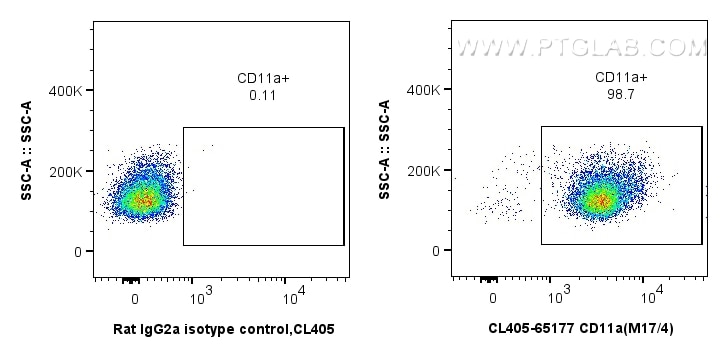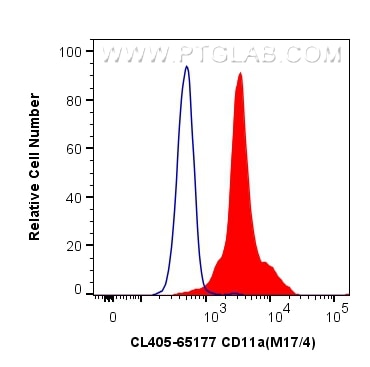Tested Applications
| Positive FC detected in | mouse thymocytes, mouse splenocytes |
Recommended dilution
| Application | Dilution |
|---|---|
| This reagent has been tested for flow cytometric analysis. It is recommended that this reagent should be titrated in each testing system to obtain optimal results. | |
| Sample-dependent, Check data in validation data gallery. | |
Product Information
CL405-65177 targets CD11a in FC applications and shows reactivity with Mouse samples.
| Tested Reactivity | Mouse |
| Host / Isotype | Rat / IgG2a, kappa |
| Class | Monoclonal |
| Type | Antibody |
| Immunogen | C57BL/6 mouse splenic secondary cytotoxic T cells Predict reactive species |
| Full Name | integrin alpha L |
| GenBank Accession Number | BC145802 |
| Gene Symbol | CD11a |
| Gene ID (NCBI) | 16408 |
| RRID | AB_2934367 |
| Conjugate | CoraLite® Plus 405 Fluorescent Dye |
| Excitation/Emission Maxima Wavelengths | 399 nm / 422 nm |
| Form | Liquid |
| Purification Method | Purified by protein-A affinity chromatography |
| UNIPROT ID | B7ZN92 |
| Storage Buffer | PBS with 0.09% sodium azide. |
| Storage Conditions | Store at 2-8°C. Avoid exposure to light. Stable for one year after shipment. |
Background Information
CD11a, also known as integrin αL or LFA-1α, is a 170-180 kDa transmembrane glycoprotein that forms a heterodimer with CD18 (PMID: 7027264; 1672643). CD11a/CD18 (LFA-1) is expressed by all leukocytes and mediates cell adhesion through interactions with its ligands, intercellular adhesion molecule 1 (ICAM-1), ICAM-2, and ICAM-3 (PMID: 7479767). CD11a/CD18 also functions in lymphocyte costimulatory signaling (PMID: 1972160).
Protocols
| Product Specific Protocols | |
|---|---|
| FC protocol for CL Plus 405 CD11a antibody CL405-65177 | Download protocol |
| Standard Protocols | |
|---|---|
| Click here to view our Standard Protocols |





